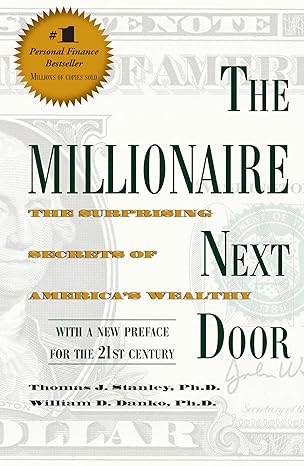Overview : The Millionaire Next Door
-
Book Title: The Millionaire Next Door
-
Author: Thomas J. Stanley and William D. Danko
-
Publication Date: October 1996
-
Rating: 4.5
-
price: $36.78
-
Pages: 272
About the Author
Thomas J. Stanley was a researcher and expert in studying the habits of America's wealthy, known for his groundbreaking work on financial independence. William D. Danko, a professor of marketing, collaborated with Stanley to uncover the surprising traits of millionaires. Together, they co-authored "The Millionaire Next Door," shedding light on how ordinary people achieve extraordinary wealth through discipline and smart financial decisions.
Introduction to The Millionaire Next Door
In the realm of personal finance literature, few books have made as significant an impact as "The Millionaire Next Door." Published in 1996, this groundbreaking work by Thomas J. Stanley and William D. Danko continues to shape our understanding of wealth accumulation and financial success. This review delves into the key insights, strengths, and potential limitations of this influential book, exploring its relevance in today's dynamic financial landscape.
The Millionaire Next Door Book Summary
"The Millionaire Next Door" challenges conventional wisdom about wealth, presenting a portrait of millionaires that defies popular stereotypes. Through extensive research and surveys, Stanley and Danko reveal that the truly wealthy in America often lead surprisingly frugal lives, prioritizing financial independence over conspicuous consumption.
"Wealth is not the same as income. If you make a good income each year and spend it all, you are not getting wealthier. You are just living high."
The authors introduce the concepts of "Prodigious Accumulators of Wealth" (PAWs) and "Under Accumulators of Wealth" (UAWs), categorizing individuals based on their wealth-building efficiency. They identify seven common characteristics of PAWs, including living below their means, allocating time and money efficiently, and valuing financial independence over social status.
Analysis of Themes
1. Frugality and Discipline
The book emphasizes that most millionaires achieve their wealth through consistent financial discipline rather than high salaries or inheritance. This focus on frugality aligns with modern investing principles that stress the importance of controlling expenses and maximizing savings rates.
2. Economic Outpatient Care
An intriguing concept explored is "economic outpatient care," where financial support from parents to adult children can paradoxically hinder wealth accumulation. This insight remains relevant in discussions about generational wealth transfer and financial independence.
3. Entrepreneurship and Self-Employment
The authors highlight the prevalence of business ownership among millionaires, a theme that resonates with current trends in entrepreneurship and the gig economy. This aspect of the book provides valuable insights for those considering self-employment as a path to wealth.
Writing Style and Presentation
Stanley and Danko present their findings in a clear, data-driven manner, balancing statistical analysis with illustrative anecdotes. The writing is accessible to a general audience while maintaining a scholarly rigor that lends credibility to their conclusions.
Strengths and Weaknesses of The Millionaire Next Door
Strengths:
- Comprehensive research methodology
- Challenges common misconceptions about wealth
- Provides actionable insights for wealth accumulation
- Emphasizes long-term financial planning
Weaknesses:
- Some data may be outdated given economic changes since publication
- Limited discussion of modern investment vehicles (e.g., cryptocurrencies)
- May not fully address wealth-building challenges faced by younger generations
Related Books to The Millionaire Next Door
While "The Millionaire Next Door" focuses on the habits of the wealthy, it complements other personal finance classics like "Rich Dad Poor Dad" by Robert Kiyosaki and "Your Money or Your Life" by Vicki Robin. However, it stands out for its empirical approach and focus on the behavioral aspects of wealth accumulation.
For readers seeking more current market analysis and investment strategies, books like "The Simple Path to Wealth" by JL Collins offer updated perspectives on index fund investing and modern portfolio theory.
Relevance in Today's Financial Landscape
Despite being published over two decades ago, many of the book's core principles remain relevant in today's financial environment. The emphasis on living below one's means and prioritizing savings aligns well with current personal finance advice. However, readers should complement this book with more recent resources on topics such as:
- Digital banking and fintech solutions
- Sustainable and ESG investing
- Navigating student loan debt
- Gig economy income strategies
Highlights from The Millionaire Next Door by Thomas J. Stanley and William D. Danko
Frugality Over Flash: Millionaires tend to live below their means, prioritizing savings and investments over lavish spending.
Wealth Accumulation Habits: Most millionaires are disciplined savers, spending less than they earn and investing consistently.
Self-Made Wealth: Many are self-made, building wealth through smart choices rather than inheritance.
Focus on Financial Independence: Wealthy individuals prioritize financial security and independence, not status or appearances.
Budgeting and Planning: Millionaires plan meticulously, tracking expenses and setting long-term financial goals.
Economic Self-Sufficiency: They avoid relying on financial support from others, including family, fostering self-reliance and independence.
Conclusion
"The Millionaire Next Door" remains a cornerstone text in personal finance literature. Its data-driven approach and counterintuitive findings continue to offer valuable insights for those seeking to build wealth. While some aspects of the book may benefit from updating, the core principles of frugality, disciplined saving, and long-term financial planning are as relevant today as they were when the book was first published.
For readers looking to develop a solid foundation in personal finance and wealth-building strategies, "The Millionaire Next Door" is an essential read. It provides a blueprint for financial success that, when combined with modern investment knowledge and tools, can help guide individuals towards greater financial independence and security.





